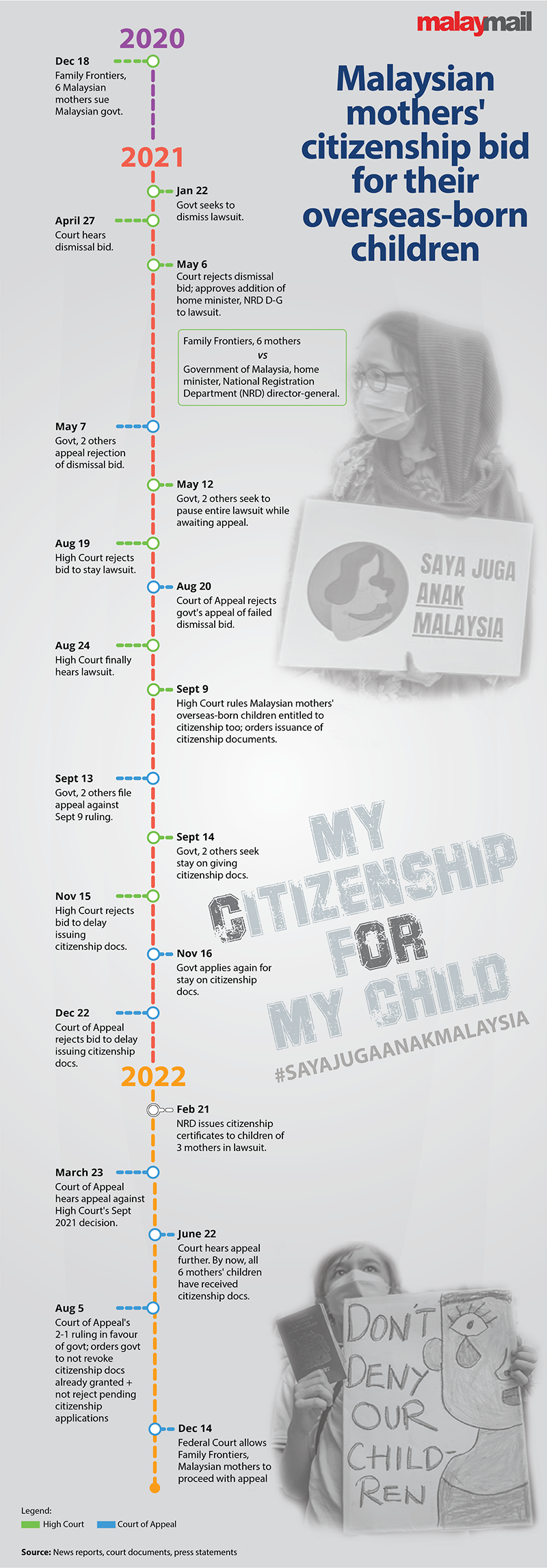KUALA LUMPUR, Feb 18 — The Anwar Cabinet’s decision today to update current laws to confer automatic citizenship to the offspring of Malaysian women who give birth overseas drew praise from two groups that have been advocating gender equality and children’s rights.
Local advocacy group Family Frontiers and the Malaysian chapter of the United Nations High Commissioner for Refugees (UNHCR Malaysia) were swift in commending the Cabinet for agreeing to amend the Federal Constitution so that children born abroad to Malaysian mothers can gain automatic Malaysian citizenship.
“Gender inequality in nationality laws puts children at risk of statelessness. This amendment keeps Malaysia on track with the Global Action Plan to End Statelessness by 2024 for all States to have nationality laws which treat women and men equally with regards to conferral of nationality.
[BREAKING] Family Frontiers welcomes the cabinet’s decision to grant the overseas born children to Malaysian mothers automatic citizenship.#SayaJugaAnakMalaysia pic.twitter.com/iDQvgR3qGc
— Family Frontiers #sayaJUGAanakMalaysia (@FamilyFrontiers) February 18, 2023
“Good work Malaysia,” said UNHCR Malaysia, which works to uphold the rights and improve the lives of vulnerable groups such as refugees and stateless individuals.
Malaysia has for decades been stuck with citizenship laws that were seen as unfair and discriminatory against women, as the Federal Constitution only granted automatic Malaysian citizenship to children born overseas to Malaysian men with foreign wives, but not Malaysian women with foreign husbands.
Malaysian mothers are required to apply to the state to recognise their children born outside the country as Malaysians – a process that often involves years of waiting and could result in rejections without being told why.
The mothers also could only re-apply for their children's Malaysian citizenship up until the age limit of 21 years old, all while facing hardship and difficulties, such as higher education and healthcare costs and uncertainty for their children's future.
Some Malaysian mothers were not able to fly back to Malaysia to give birth due to high-risk pregnancies or did not even know the government would reject Malaysian citizenship for their children just because they were born abroad.
There is also the risk of Malaysian mothers' overseas-born children ending up stateless, such as in the case of Mashithah Abdul Halim whose youngest child is stateless or without citizenship from any country.
After years of frustration, Family Frontiers along with six affected Malaysian mothers launched a legal challenge in December 2020 to seek for their children to be recognised as Malaysians and to stop the country's citizenship laws from discriminating against women.
Family Frontiers and the mothers won at the High Court, but the government later won at the Court of Appeal in a 2-1 decision.
The Federal Court last December allowed the mothers and Family Frontiers to proceed to have their appeal heard, and has yet to fix a hearing date for the appeal but will conduct case management this March 15.
Today, Family Frontiers thanked the Cabinet and welcomed its decision to bring the proposed legal changes to Parliament to allow Malaysian mothers the right to confer citizenship on their overseas-born children on the same basis as Malaysian fathers, calling this a "significant step forward".
Family Frontiers president Suriani Kempe said the Malaysian mothers are awaiting for the Malaysian government to table the proposed changes to the Federal Constitution's citizenship laws.
“I am encouraged by the Cabinet’s decision. It is an acknowledgement that the government recognises the struggles of Malaysian women and their overseas-born children, and that this discrimination must be rectified as quickly as possible.
“We are now waiting with bated breath for the amendments to be tabled in Parliament; only once the amendment passes can we breathe out in relief – because it is thereafter that the mothers will be able to submit their children’s documents to JPN in order to receive citizenship certificates. But we are certainly on the right track," she said in a statement.
The proposed amendment to the citizenship laws in the Federal Constitution will require support from two-thirds of lawmakers in Parliament, and would have to go through the process of being voted through in the Dewan Rakyat and Dewan Negara and receiving royal assent and being gazetted before taking effect as law.
Family Frontiers said it looks forward to the smooth passage of the amendment in Parliament and consent from the Conference of Rulers.
“We urge all relevant stakeholders to work together to ensure that the amendment is implemented in a timely and effective manner.
“This is an important moment for the families affected by this issue, and we hope that this amendment will bring much-needed relief and security to those who have been waiting for so long,” it said.
“With this amendment, the various obstacles that the mothers and children face including family separation, obstacles to accessing long term resident status, education, healthcare, and social services will soon come to a relieving end,” it added.





















